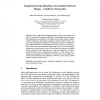Free Online Productivity Tools
i2Speak
i2Symbol
i2OCR
iTex2Img
iWeb2Print
iWeb2Shot
i2Type
iPdf2Split
iPdf2Merge
i2Bopomofo
i2Arabic
i2Style
i2Image
i2PDF
iLatex2Rtf
Sci2ools
100
click to vote
REFSQ
2015
Springer
2015
Springer
Requirements Specification as Executable Software Design - A Behavior Perspective
Today’s application development requires agile project structures and active involvement of concerned stakeholders. Transforming of representations from requirements specification to executable design models hinders seamless roundtrip engineering and dynamic adaptation. Subject-oriented software processes allow fine-grained modeling and subsequent execution of mutually adjusted stakeholder behaviors representing the business logic of an organization. They enable continuous requirements engineering in the sense of non-disruptive articulation and specification of process knowledge that represents executable software elements. In this contribution we reveal these capabilities of Subjectoriented Business Process Management according to several scenarios of requirements management: (i) development of some business logic starting from scratch, and (ii) extensions and adaptation of behaviors. Each scenario is illustrated by respective business cases.
Related Content
| Added | 17 Apr 2016 |
| Updated | 17 Apr 2016 |
| Type | Journal |
| Year | 2015 |
| Where | REFSQ |
| Authors | Albert Fleischmann, Werner Schmidt, Christian Stary |
Comments (0)

